It’s not uncommon in the martial arts world for different styles to be compared and pitted against each other, and BJJ vs Judo is a logical match up! Brazilian Jiu Jitsu and Judo seem to be more similar than different, as both are grappling arts that are often practiced in the gi. But what are the differences between BJJ and Judo? Is one better than the other? This article will answer these questions and more!
BJJ vs Judo – Yin and Yang?
A few years ago, while visiting Hybrid Martial Arts Center in Roanoke, I met Brian Mathis, an experienced Judoka and Jiu Jitsu practitioner. Brian began his martial arts journey with Judo in 2004, and started Jiu Jitsu the following year.
In my experience, it wasn’t unusual for the average Jiu Jitsu player to know a few Judo techniques, but Brian, being a seasoned student of both arts, was a rarity.
However, as a student of both BJJ and Judo, Brian is unsure that a comparison between the two is appropriate. “I really love both martial arts. To me they both complete each other, almost like a yin and a yang,” Mathis said.
Despite his positive feelings toward both martial arts, Brian admits that there are a few key differences between BJJ and Judo.
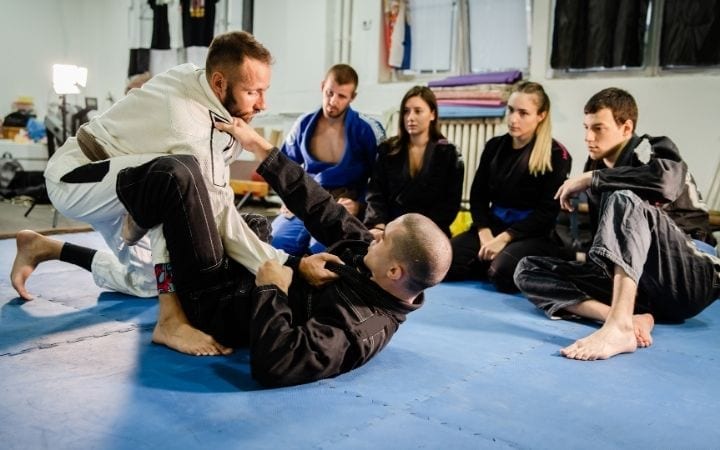
Comparing Techniques and Competition in BJJ and Judo
The differences in the practice of Brazilian Jiu Jitsu and Judo is readily apparent. According to Mathis “They both have pros and cons. I feel both can be practical for self-defense and for sport. If we are talking self-defense both are equally powerful. [Although] Jiu Jitsu is more focused on protecting from strikes than Judo.”
While both Judo and BJJ can be practical martial arts, their respective competition formats highlight major differences in how the sports are trained.
BJJ Competition Rules
In a Brazilian Jiu Jitsu competition, competitors will start on their feet. However, how they proceed from there is purely preference. While a competitor can incorporate Judo into their grappling, they are also free to use wrestling techniques, or even sit/pull guard to bring the fight to the ground.
While Jiu Jitsu competitions follow specific rules, its format permits a wider range of options than a Judo competition. BJJ allows the passivity of sitting guard, a wider range of submissions, and takedowns which involve grabbing an opponent’s legs (such as a double leg).
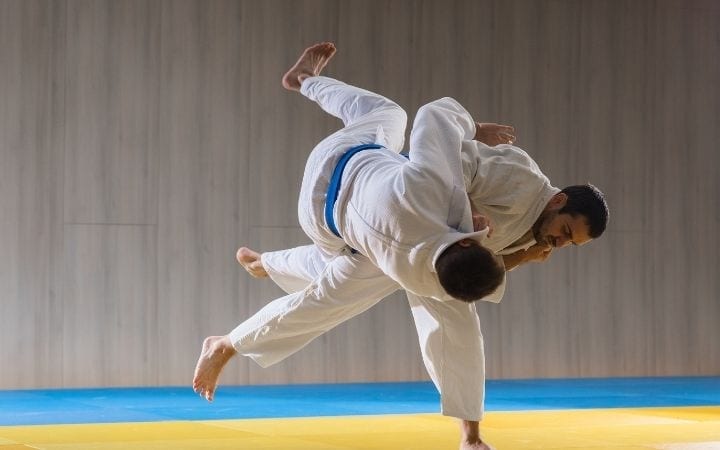
Judo Competition Rules
In competitive Judo the main focus of the bout is on the Judo throw or takedown. However, groundwork, called newaza, is present in the match and can be a path to victory.
While a BJJ match can be won through points or submission, a Judo match places a special hierarchy on its point system that reflects a competitor’s performance. The points are categorized as Ippon, Waza-ari, and Yuko.
A competitor immediately wins the match when they score Ippon. They can do so with a quick and decisive throw that lands their opponent straight onto their back. Ippon can also be achieved with a choke or arm lock, which would similarly end a BJJ match. Lastly, holding an opponent down for 20 seconds scores an Ippon.
Waza-ari does not instantly end a Judo match, but scoring two Waza-ari’s equals an Ippon. A competitor can earn Waza-ari with a throw that doesn’t quite land on the back or via a 15 second long pin.
Yuko can be thought of as more traditional points. No amount of Yuko will equal Ippon, but they can decide the match at the end of a round if Ippon or Waza-ari are not achieved.
The Judo point format creates a more rigid structure that can turn a match into a series of new exchanges. However, a Brazilian Jiu Jitsu match will, for the most part, continue to flow without stop or reset unless a submission is achieved, time is reached, or competitors have gone out of bounds.
Using Judo in BJJ and BJJ in Judo
Despite the differences in competition format, Judo and BJJ competitors borrow aspects of each other’s games to strengthen their own. While a Judoka can’t sit or pull guard, a well executed choke or arm bar can earn them Ippon.
On the other hand, while a Judo throw won’t end a BJJ match, it can earn the competitor points and create a tactical advantage during the match.
Brians adds that “a person needs to understand the takedown is very important. If you can’t get a person down to the ground then Jiu Jitsu can become a harder task to practice.”
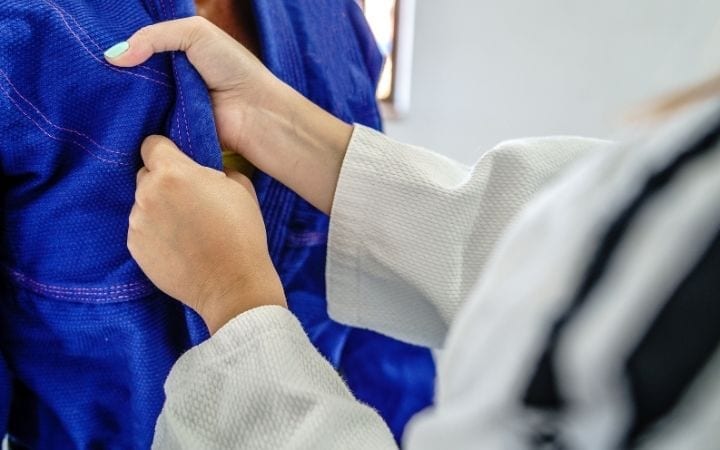
Is A Gi Just a Gi? The Uniform of Judo vs BJJ
At first glance, it might be easy to confuse a Brazilian Jiu Jitsu practitioner and a Judoka. While one can certainly be both, the attire for the respective sports can have both subtle and more obvious differences.
Although a gi is used for BJJ practice it does not have the same level of emphasis placed on its regulation as the Judogi. In competition, the Judogi has a predetermined set of specifications it must meet to be eligible for a match.
Conversely, the materials and designs used for BJJ gis have become as varied as the practitioners themselves. A glance at the crowd at a BJJ tournament will show gis of various colors and styles.
The size of the Judogi, including its length and thickness, on a given Judoka is taken into consideration to ensure there is equal throwing capability between opponents. With some tournament exceptions, such as the IBJJF, there is not as much of an emphasis on the gi size in BJJ, within reason.
The greatest difference in BJJ and Judo practice, in terms of apparel, would be the practice of no-gi BJJ. Without the use of the gi, BJJ practitioners must rely on natural grips such as the head, neck, wrists, and ankles.
No-gi creates a dynamic shift in how BJJ players engage an opponent. This sort of fundamental change in technique is not present in Judo practice or competition.
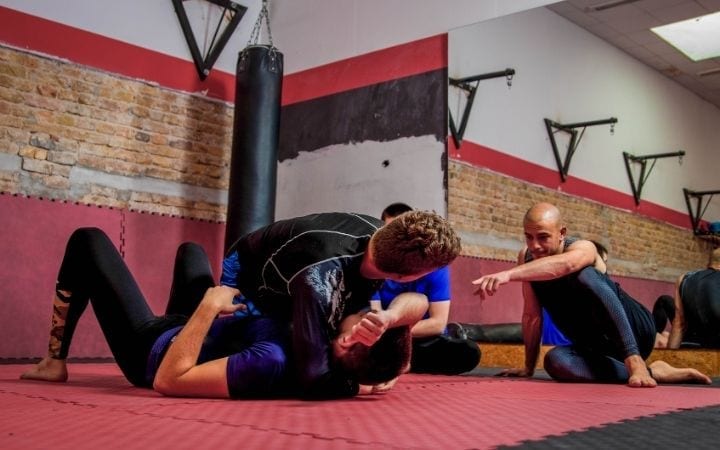
Popularity of Judo vs BJJ
Gauging the popularity of these two martial arts can be a tricky thing without relying on anecdotal evidence. Many organizations that accrue these kinds of statistics stand to gain from touting their respective sport as the most popular.
Judo, in particular, finds itself in an interesting position. Although Judo predates Brazilian Jiu Jitsu and is an Olympic event, you might find it difficult to find a gym or academy that is dedicated solely to its practice in the United States. However, Judo still has a dedicated following of athletes in certain hotspots around the world.
In America, however, Judo was, and is, considered to be more niche than its grappling counterparts. Gary Goltz, President of the US Judo Association, explained the phenomenon in an interview with Blackbelt Mag.
“Judo’s popularity soared in most countries with the exception of the U.S.. This was due to the national judo organizations’ insistence on maintaining their members’ amateur status to meet Olympic requirements at the time.”
Goltz’s Olympic explanation points to the more political side of competitive Judo, but what about the average practitioner? What would make them choose another martial art over Judo?
Goltz continued his explanation saying that, “Here (the US), other martial arts — karate in the 1960s, Kung Fu in the ’70s, and then Brazilian Jiu Jitsu and Krav Maga now — flourished in part because of the entertainment industry and successful commercialization methods.”
On the other hand, Brazilian Jiu Jitsu has proliferated globally–especially in the US–by infiltrating nearly all forms of media, including film, television, and radio. Since beginning my Jiu Jitsu training in 2008, I have personally seen the evolution of Jiu Jitsu’s reach into the mainstream.
One of the most common questions to break the ice on the mats is “how did you hear about Jiu Jitsu?” When I started, the answer was nearly always “watching UFC.” Today, the answer is nearly always “the Joe Rogan Experience.”
The Joe Rogan Experience is the number one podcast in several categories including listenership. While we lack the statistics to gauge Jiu Jitsu’s popularity, we can see how prevalent the sport is in pop culture and conclude it bests Judo in this regard.
Philosophy of Judo and BJJ
Perhaps the closest comparison that can be made between Judo and Brazilian Jiu Jitsu is the philosophies they attempt to instill in their practitioners. Their similarities can be summed up by their nicknames. Judo translates to “gentle way,” while Brazilian Jiu Jitsu is often referred to as arte suave, or the “gentle art.”
For Kano, the practice of Judo was more about the mental aspects surrounding the lifestyle of a judoka.
The International Judo Federation describes Jigoro Kano’s philosophy as a three-pronged approach: “the acquisition of knowledge, the teaching of morality, and the training of one’s body by physical education.”
However, with much of Brazilian Jiu Jitsu’s popularity steeped in modern times, it might be easy to see much of the early philosophy of the sport as just good marketing.
Brazilian Jiu Jitsu, through its practice, promotes much of the standard philosophies touted by other martial arts, such as self-confidence, humility, self-defense, and the weak overcoming the strong. Helio Gracie described the art as being “designed to give the weak ones a chance to face the heavy and strong.”
Many BJJ practitioners can probably attest to hearing some variation of this platitude as they were starting their training.
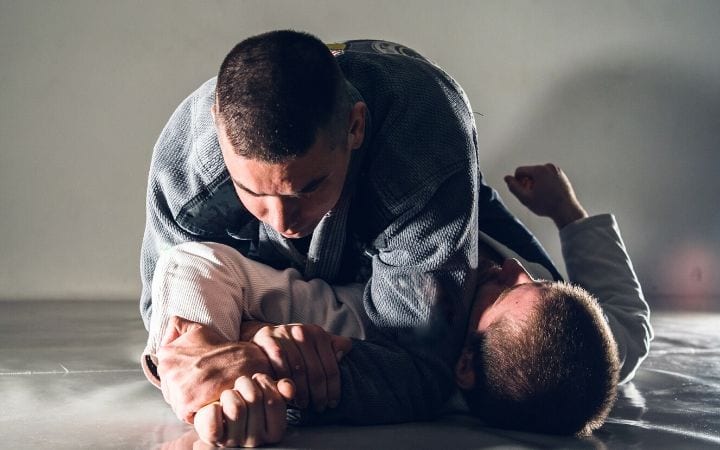
Judo and Brazilian Jiu Jitsu share many commonalities, including philosophies and techniques. However, examining and understanding their differences can help one become a more well rounded martial artist.
Although Judo may not be the household name that Brazilian Jiu Jitsu is these days, it holds an important place in sports history. Whichever art you feel is superior, it is certain that Jigoro Kano and Helio Gracie left behind an important legacy of self-improvement and self-defense for all of their students.
For some, the question of Brazilian Jiu Jitsu vs Judo just doesn’t make sense. With more than a decade of experience in both, Brian Mathis recognizes and celebrates the similarities and differences in the two sports.
“To me Judo and Jiu Jitsu will always be my love. They have done so much for me. They changed my life, challenged me, and made me a better person.”
Jeremy is brown belt and has a Bachelor’s degree in journalism, but he also enjoys creative writing. Originally from Connecticut, where he began his 11 years of Jiu Jitsu training.

3
5